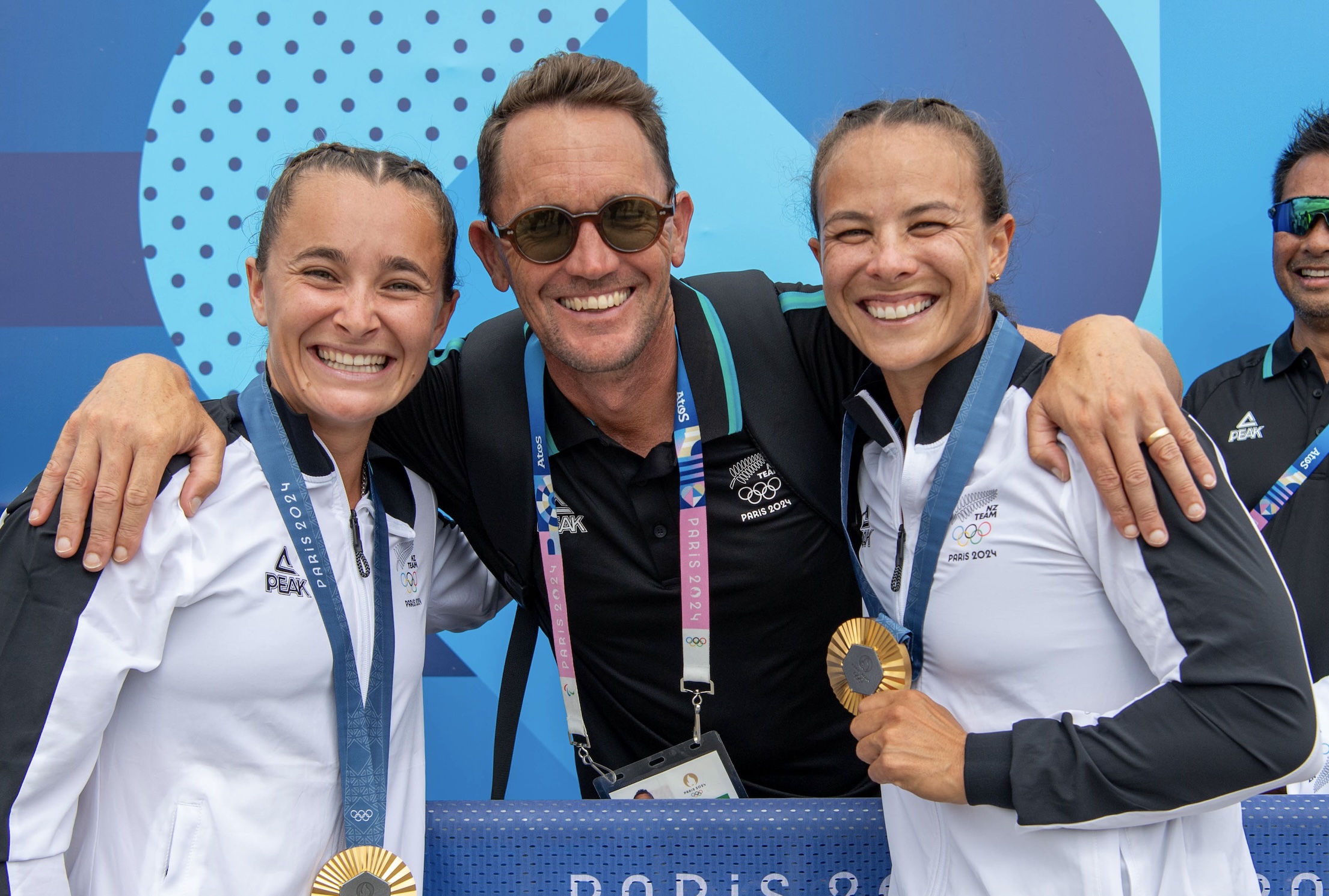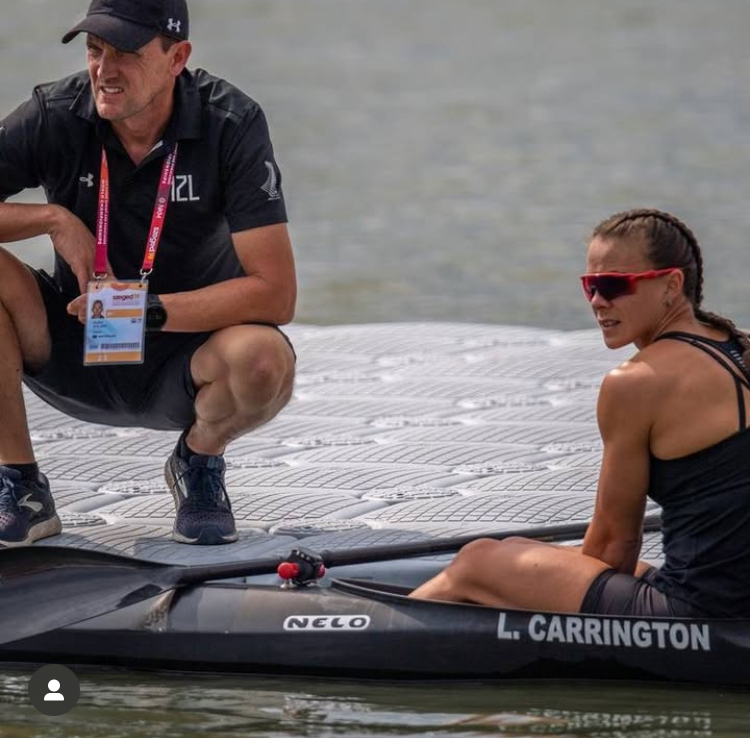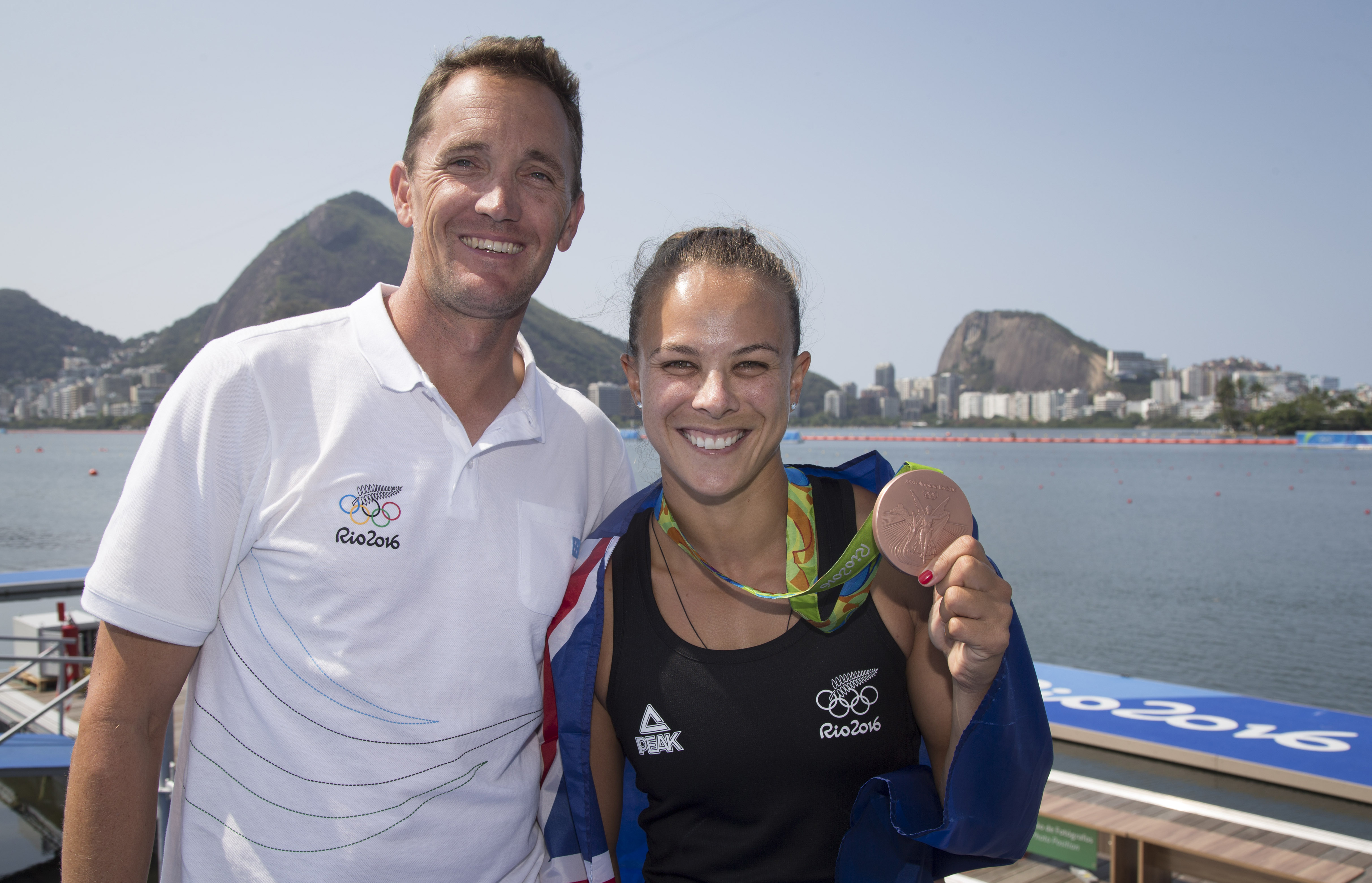Gordon Walker
Gordon Walker
- Coach Profile
A determined focus as an athlete, sharpened considerably by a constantly enquiring mind where he delved deeply into the process of performance, ultimately led Gordon Walker to becoming the famed coach he is today.
In tandem with canoe racing queen Dame Lisa Carrington, “Gordy’’ as he is affectionately addressed by those who know him best, has become a household name, the pair forging an outstanding legacy as the most successful coach-athlete partnership in New Zealand Olympic history.
Given the role of Intern Coach at Canoe Racing New Zealand in 2010 heralded the start of Walker’s high performance coaching career and subsequently moving into the sport’s lead coach role for the New Zealand women’s squad in the K1, K2 and K4 kayaks.
He has since been decorated with an unprecedented six New Zealand Coach of the Year titles while also being acknowledged as Coach of the Decade (2011 – 2020). Those achievements have gone hand-in-hand with Carrington becoming New Zealand’s most successful Olympian (eight gold medals, one bronze) and the women’s K4 crew winning a first-ever world title in 2023 while also claiming an historic first gold medal in the same event at the Paris Olympics the following year.

“I wouldn’t say there’s a secret formula but I would say that there are certain things that are really helpful in becoming a good coach,’’ an ever-modest Walker said. “It’s probably around understanding what those are for you, and a lot of those things you take for granted. You don’t know that they are the things.
“There’s a couple of really important factors. You have to have a deep care for the athletes and ultimately, you have to be there, not for you but for them, knowing that it’s up to you.
“You really do have to have a lot of intelligence for the sport that you’re in. People take it for granted that they know the game. You need to know the game and I don’t think you can ever know it well enough.
“The other aspect might be how you learn about yourself in order to relate to people and once again, that’s a never-ending journey of learning and improvement. The more you can get better at that, the better you will be as a coach.’’
As a pupil at Kings College, in Auckland, Walker had a crack at most sports and was equally proficient at most before concentrating on cycling and multisport events after leaving school.
“When I left school I got into cycling and there wasn’t nearly as much formal coaching available as there is today,’’ he said. “The consequence was that I needed to learn how to get fit and how to train, and I had to become relatively self-sufficient.
“I was really interested in the training part of the performance process for cycling and just really, really wanted to get better. To do that, I sort of taught myself self-training and reading tonnes and tonnes of books and asking people as much as I could about training.’’

One book, in particular, written by celebrated US road racing cyclist and triple Tour de France winner Greg LeMond, provided inspiring chapters on how to train, some of the principles of which Walker still uses to this day.
A change in academic direction also proved defining in Walker’s future career of choice.
“When I left school, I did an architectural drafting course but I worked out my passion was more in sport, so after three years of doing that, I changed and did a sports science degree, physiology and exercise science, so that was pretty much the foundational part of the training,’’ he said.
“After that I got into coaching and was coaching different people from different sports.
“I always had a real deep interest in sport and when I competed in the sports I did, I always wanted to do well in them. And I always knew to do well I needed to do the training and the practice, so the learning about what it was going to take was always interesting to me.’’
Having competed as a runner, cyclist and canoe slalom racer in his teens, the famous Coast to Coast multi-sport race always held a special fascination for Walker and he made his first attempt at the 243km-long event in 2003, finishing seventh.
He went on to finish runner-up in the 2005 and 2006 editions, cracking the code with a win in 2007 which he backed up with further wins in 2009 and 2010.
He coached this year’s winner, Tasmanian Alex Hunt, to the title via chats over the phone and without ever having met him.
Walker never aspired to be a coach and would have preferred to have been “a better athlete’’.
“When I went to university it wasn’t about coaching per se, it was more being a part of how the performance might happen and that could have been in different areas of sport but it ended up becoming coaching,’’ he said.
And it would seem, he has landed in the most perfectly suited of vocations from the wide-ranging career choices the world of sport has to offer.
“In the day-to-day process of training and performing, I’m more fascinated by the process,’’ Walker said. “Obviously, the competing, the winning and the moment in the big moments, I love those but I think the thing that has to draw you back is the love and the joy of the process.
“I love that process of chasing the continuous improvements and seeing people be a little bit better today than they were yesterday. And that’s probably as complicated as it is for me.’’
During his own training, Walker was surrounded by classy high performance athletes, including the likes of Ben Fouhy (2004 Olympic K1 silver medallist) and Cameron Brown (multiple Ironman New Zealand winner), who played key roles in his evolution.
“They had access to a lot of the things that I knew I would like to have if I was to be coaching people properly whereas the coaching that I did, people were very much limited by the resources we could either access or afford, so the reason I wanted to get into high performance was that I knew there were no limits,’’ he said.
“So, whatever you wanted to do, you could achieve and that was the principal reason I wanted to get into high performance, I wanted to do things properly and I knew if I had the chance to be in an environment where those things were on tap, then I could utilise them.’’
That opportunity presented when Walker successfully applied for the role of Intern Coach with Canoe Racing New Zealand in 2010, he has remained part of their high performance programme ever since.
Fifteen years on, and Walker hasn’t looked back, his success and partnership with Carrington in particular, elevating the profile of the sport and New Zealand’s status while also increasing opportunities for a burgeoning wealth of paddling talent.

“I’m extremely lucky to be in a job where it’s quite a privilege to be able to have all of the stuff that we have and it’s paid for by the Government, and to work with the people that I work with,’’ he said.
“I feel like every day I have a clean sheet and every day’s a chance to challenge what is possible whereas so many other people are so constrained by resources and so on, where we are not. And I think the thing that excites me is the opportunity to help people be the greatest that they can possibly be.
“These people have a desire to want to do that but often they don’t know how good that could be. They don’t know what steps it might take to get there and a lot of the time the attraction is to help people to see the limitations that maybe they’re putting on themselves and that there’s a lot more out there for them.
“So, the attraction, I think is to help people to achieve their dreams but to also challenge them in the sense that maybe they could dream a little bit more.’’
Success for Walker has been built on the process, which for him remains the most important ingredient, his stellar return over many years too difficult to place in any order of merit.
“I am really lucky to have had so many (great moments) and it’s hard to single out one above the other,’’ he said.
“One thing I would say though is that while I may pick out a few, every moment is important because it takes you to the next moment. While the preceding moment may have been hard or challenging, you may not have had the next moment of success and joy without having had the tough times.
“So, while you might say a particular moment was great, you might not have had that without having figured out what not to do.
“But certainly I’d say the K4 winning in Paris (2024 Olympics) is actually hard to put into words how incredible that was because there are so many reasons why that shouldn’t or couldn’t have happened or was theoretically impossible. Something I really like doing is going on a journey of discovery and trying stuff which on the surface of things seem like madness….. and that was a special moment.
“Lisa (Carrington) winning her first K1 500m world champs. That was a pretty incredible moment…..she was so young and we were so naïve. And when I look back at her winning the London (2012 Olympics) gold…… at the time, it seemed `yep, we can do this’ but looking back on it, it was pretty audacious.
“It’s hard to single out the moments and those are the nice moments that people see but probably more importantly there’s all of those moments in the build-up to those events which are also very important and equally memorable.’’
There have been many who have helped shape Walker’s coaching career with the biggest accolade going to the athletes.
“The most important people would absolutely be the athletes,’’ he said. “I’ve learnt a lot from people who I’ve talked to like High Performance Coaching Consultant Tristan Collins, who’s been a fantastic resource to me.
“I think there’s so much learning that happens in-situ, in the moment, so I’d probably say it’s all of the athletes who, and they don’t have to better or faster, but all of them in different ways, have been probably the greatest source of learning, including the athletes I have worked with who aren’t paddlers.
“I’ve coached a lot of people who have won the Coast to Coast or an ironman or triathlon prior to this point and done a lot of training with the likes of Cameron (Brown) and learnt so much from being around him, it’s hard to say that I would have had the same habits without having exposure to people like him and Ben (Fouhy) and so on.’’
Walker describes Carrington as not a once in a generation athlete but “one in many generations’’ who after four successful Olympic campaigns “is still getting better’’.
“It’s a dream job in the sense that with someone so capable there are so many things you are able to do that you might not be able to do with other people,’’ he said. “So, while you may have the ideas they may not be able to be put into practise and that’s one of the things that’s been incredible.
“Sure, she is a generational athlete and she’s the fastest but it’s a dream to coach any one of them. The girls in the K4 are all as unique and special as one another. Just because one’s faster doesn’t mean it’s more of a dream job.
“So, it’s just a dream job to be a coach. I’ve always considered it an incredible privilege to be afforded peoples’ trust and irrespective of whether they’re Olympic gold medallists or not, that trust is a currency and it doesn’t go by results. And that’s probably the dream part of the job.’’